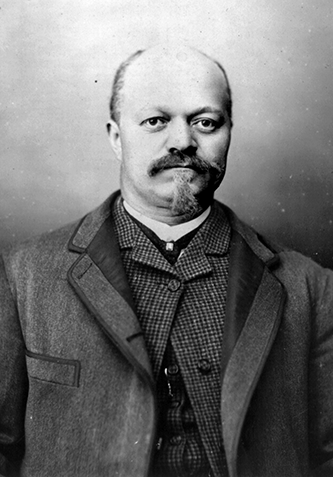March 28, 1849 - March 31, 1904

Warren Clay Coleman, merchant, businessman, and manufacturer, was born into slavery as the son of Roxanna "Roxie" Coleman, a woman enslaved by Daniel Coleman, Sr., of Concord, and Rufus Clay Barringer. Roxie later married John F. Young, an enslaved man and blacksmith. Often when enslaved people married, the man's enslaver purchased the woman from her enslaver. Contrary to this usual practice, Roxie's husband was enslaved on the Coleman estate, and Roxie and John's family, including Warren, remained there as a unit.
Coleman's first twenty-one years were consumed by enslavement, farm work, and apprenticeship that constrained his highly motivated personality. During the Civil War, he worked for the Confederacy, making boots and shoes. Following emancipation, he was bound to William M. Coleman, a Cabarrus planter and lawyer who later became North Carolina's attorney general. Coleman educated and trained young Warren until March 28, 1870, when Warren was released. Warren went to Alabama for a year, seeking economic opportunity. He returned to Concord in 1871 and began his business career, starting as a collector of rags, bones, and junk and becoming one of Concord's richest merchants. From 1873 to 1874 he attended Howard University as a student in the Model School, preparing himself for business opportunities.
Coleman's first business was a combination barber shop and cake and candy store. Under Rufus Barringer's guidance, he bought land in areas of Concord with many Black landowners where he erected frame rental houses. Between 1875 and 1904 he developed nearly one hundred rentals; he purchased four farms and a substantial number of city lots, thereby becoming one of Cabarrus County's largest property owners and most influential citizens.
On December 30, 1873, Coleman married Jane E. Jones, daughter of Joseph and Caroline Loyd of Alabama. On Warren and Jane Coleman's marriage certificate, both are identified as "yellow."
In 1879 he combined his two shops into a large general store that became one of Concord's major retail establishments. A proud and frugal man who sought wealth and fame, he extended his influence into North Carolina's Black community. He was a member of the North Carolina Industrial Association, an African American group seeking to develop African American owned businesses and a long-time advocate for the North Carolina Colored Industrial Association Fair. He served as North Carolina Industrial Association's vice-president, treasurer, and president.
His success was not without challenges, however. In September of 1885, his business burned for the third time without fire insurance.
By 1895, Coleman was considered one of the South's richest African Americans. He helped found the National Negro Protective Association and assisted Black education at Howard University, Livingstone College, and Shaw University. He supported the North Carolina Oxford Orphans' Home and aided Professor R. M. Alexander in developing the Coleman School in Welford, S.C. His philanthropy extended to the Zion Hill Church and Price Memorial Temple in Concord.
In mid-June 1896, Coleman tested the climate for a African American owned mill. Prominent white textile leaders, spearheaded by Washington Duke, supported his efforts. Coleman initially sought to raise $50,00 in stock subscriptions from Black supporters, but they lacked the economic base to sustain such a venture, and he was forced to borrow from the Duke family. In February of 1897, Coleman announced that he was going to open the first Black owned cotton mill in the United States. The cornerstone for his Coleman Manufacturing Company was laid in February of 1898 and the mill began production in June 1901. Coleman Manufacturing was the nation's first African American owned and operated textile factory. Initially, Coleman's venture enjoyed some success, but financial frailties and external market conditions overwhelmed the mill. The mill was underfinanced and opened with secondhand machinery, and in December of 1903, Coleman resigned as director of the mill. Only three months later, Coleman died suddenly on March 31, 1904 in Concord at the age of 55.
Dr. W.H. Goler, President of Livingstone College, led Coleman's funeral which was well-attended. Coleman was buried in a graveyard that he and other trustees of the Zion Hill AME Zion Church began when they acquired the seventeen-acres now known as the Old Campground Cemetery in Concord. His mother, Roxie Young, died three weeks later on April 24, 1906. His wife, Jane E. Coleman, died two years later at the age of 70. The couple had no children.
At the time of his death, Coleman owned more than 100 unencumbered houses -- some newspapers reported as many as 350 houses -- and 57 parcels of land across the North Carolina piedmont. Forty-nine of these parcels were in Cabarrus county, with additional properties located in Rowan, Union, Forsyth, Guilford, and Stanly counties.